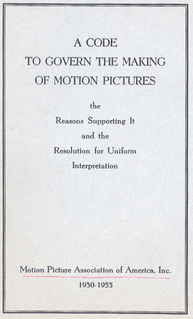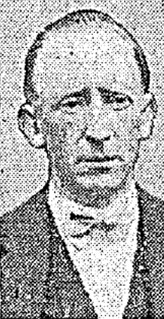Related Research Articles

The Motion Picture Production Code was a set of industry guidelines for the self-censorship of content that was applied to most motion pictures released by major studios in the United States from 1934 to 1968. It is also popularly known as the Hays Code, after Will H. Hays, president of the Motion Picture Producers and Distributors of America (MPPDA) from 1922 to 1945. Under Hays's leadership, the MPPDA, later the Motion Picture Association of America (MPAA) and the Motion Picture Association (MPA), adopted the Production Code in 1930 and began rigidly enforcing it in 1934. The Production Code spelled out acceptable and unacceptable content for motion pictures produced for a public audience in the United States.

Kevin Christopher O'Higgins was an Irish politician who served as Vice-President of the Executive Council and Minister for Justice from 1922 to 1927, Minister for External Affairs from June 1927 to July 1927 and Minister for Economic Affairs from January 1922 to September 1922. He served as a Teachta Dála (TD) from 1918 to 1927.
"Banned in Boston" is a phrase that was employed from the late 19th century through the mid-20th century, to describe a literary work, song, motion picture, or play which had been prohibited from distribution or exhibition in Boston, Massachusetts. During this period, Boston officials had wide authority to ban works featuring "objectionable" content, and often banned works with sexual content or foul language. This even extended to the $5 bill from the 1896 "Educational" series of banknotes featuring allegorical figures that were partially nude.
The Committee on Evil Literature was a committee set up by the Irish Free State's Department of Justice in 1926 to look into censorship of printed matter.
The National Legion of Decency, also known as the Catholic Legion of Decency, was a Catholic group founded in 1934 by Archbishop of Cincinnati, John T. McNicholas, as an organization dedicated to identifying for Catholic audiences, objectionable content in motion pictures. Members were asked to pledge to patronize only those motion pictures which did not "offend decency and Christian morality". The concept soon gained support from other churches.

Thomas Francis O'Higgins was an Irish Fine Gael politician and medical practitioner who served as Minister for Defence from 1948 to 1951, Minister for Industry and Commerce from March 1951 to June 1951 and Leader of the Opposition from January 1944 to June 1944. He served as a Teachta Dála (TD) from 1929 to 1932 and 1937 to 1953.
In Ireland, the state retains laws that allow for censorship, including specific laws covering films, advertisements, newspapers and magazines, as well as terrorism and pornography. In the early years of the state, censorship was widely enforced, particularly in areas that were perceived to be in contradiction of Roman Catholic dogma, including abortion, sexuality and homosexuality. The church had banned many books and theories for centuries, listed in the Index Librorum Prohibitorum.

Film censorship is carried out by various countries to differing degrees, sometimes as a result of powerful or relentless lobbying by organizations or individuals. Films that are banned in a particular country change over time.

The executions during the Irish Civil War took place during the guerrilla phase of the Irish Civil War. This phase of the war was bitter, and both sides, the government forces of the Irish Free State and the anti-Treaty Irish Republican Army (IRA) insurgents, used executions and terror in what developed into a cycle of atrocities. From November 1922, the Free State government embarked on a policy of executing Republican prisoners in order to bring the war to an end. Many of those killed had previously been allies, and in some cases close friends, of those who ordered their deaths in the civil war. In addition, government troops summarily executed prisoners in the field on several occasions. The executions of prisoners left a lasting legacy of bitterness in Irish politics.
Censorship in Germany has taken many forms throughout the history of the country. Various regimes have restricted the press, cinema, literature, and other entertainment venues. In contemporary Germany, the Grundgesetz generally guarantees freedom of press, speech, and opinion.
The Censorship of Publications Board is an independent board established by the Censorship of Publications Act, 1929 to examine books and periodicals that are for sale in the Republic of Ireland. It is governed by the Censorship of Publications Acts of 1929, 1946 and 1967. The Board has the authority to prohibit any book or periodical that they find to be obscene. This makes it illegal to buy, sell or distribute that publication in the Republic of Ireland. The Board prohibited a large number of publications in the past, including books by respected authors. However, since the 1990s it does not prohibit publications very often.

Rocky Road to Dublin is a 1967 documentary film by Irish-born journalist Peter Lennon and French cinematographer Raoul Coutard, examining the contemporary state of the Republic of Ireland, posing the question, "what do you do with your revolution once you've got it?" It argues that Ireland was dominated by cultural isolationism, Gaelic and clerical traditionalism at the time of its making. The film exposes the truth of a repressed, suppressed and censored country, and the hypocrisy of church, politics and state, through a series of 'innocent' interviews.
In the Republic of Ireland, "publication or utterance of blasphemous matter", defamatory of any religion, was a criminal offence until 17 January 2020. It was a requirement of the 1937 Constitution until removed after a 2018 referendum. The common law offence of blasphemous libel, applicable only to Christianity and last prosecuted in 1855, was believed to fulfil the constitutional requirement until a 1999 ruling that it was incompatible with the constitution's guarantee of religious equality. The Defamation Act 2009 included a provision intended to fill the lacuna while being "virtually impossible" to enforce, and no prosecution was made under it. The 2009 statute increased controversy, with proponents of freedom of speech and freedom of religion arguing for amending the constitution. After the 2018 constitutional amendment, a separate bill to repeal the 2009 provision and residual references to blasphemy was enacted in 2019 by the Oireachtas (parliament) and came into force in 2020. The Prohibition of Incitement to Hatred Act 1989, which includes religion among the characteristics protected from incitement to hatred, remains in force.

The Irish Film Theatre (IFT) was a cinema dedicated to showing art films in Dublin in Ireland from 1977 to 1984.

Book censorship is the act of some authority taking measures to suppress ideas and information within a book. Censorship is "the regulation of free speech and other forms of entrenched authority". Censors typically identify as either a concerned parent, community members who react to a text without reading, or local or national organizations. Marshall University Library defines a banned book as one that is "removed from a library, classroom etc." and a challenged book as one that is "requested to be removed from a library, classroom etc." Books can be censored by burning, shelf removal, school censorship, and banning books. Books are most often censored for age appropriateness, offensive language, sexual content, amongst other reasons. Similarly, religions may issue lists of banned books, such as the historical example of the Roman Catholic Church's Index Librorum Prohibitorum and bans of such books as Salman Rushdie's The Satanic Verses by Ayatollah Khomeini, which do not always carry legal force. Censorship can be enacted at the national or subnational level as well, and can carry legal penalties. Books may also be challenged at a local community level, although successful bans do not extend outside that area.
Book censorship was carried out in several instances in Ireland between 1929 and 1998, with all remaining bans from that period having expired by 2010. However, the laws remained on the statute books and a book was banned again in 2016. Censorship was enacted by a 1929 act of the Irish Free State.
Film censorship in the Republic of Ireland began on a national basis with the introduction of the Censorship of Films Act in 1923. This act established the office of the Censor of Films, an office since replaced and renamed in 2008 as the Irish Film Classification Office.

James O'Higgins Norman PC, MStJ, FRSA holds the UNESCO Chair on Tackling Bullying in Schools and Cyberspace at Dublin City University. He is the director of the National Anti-Bullying Research and Resource Centre, and a member of the Government of Ireland Advisory Council on Online Safety.
An Ríoghacht was a conservative Catholic group in Ireland, founded in 1926 by Fr Edward Cahill, Professor of Church History and Lecturer in Sociology at the Milltown Park Institute, Dublin.
Censorship in Francoist Spain was mandated by Francisco Franco in Francoist Spain, between 1936-1975. In Francoist Spain, primary subjects of censorship included public display of liberal political ideology, art forms such as literature and film, as well as symbols of foreign, non-conservative ideologies. This censorship was primarily driven by Franco's vision for ideological unity in Spain. As a result, Franco called for the censorship of materials that promoted liberal ideas from abroad, particular those of European origin. Aside from censorship of foreign ideology, symbols of Spanish identity, such as Catalonia, also became primary targets of censorship. Under his authoritarian reign, censorship was imposed primarily through systemic political repression. The Francoist State repressed expression of liberal social and political ideology among the Spanish public.
References
- ↑ Membership card of Cumann Fearachais na hÉireann (Irish Vigilance Association)
- ↑ Rockett, Kevin (2004). Irish Film Censorship: A Cultural Journey from Silent Cinema to Internet Pornography. Dublin: Four Courts Press. ISBN 1-85182-844-3.
- ↑ Ciaran Carty: Confessions of a Sewer Rat. p. 44
- ↑ O'Mahony, Jean (21 July 2004). "Only a sleuth could unravel the mysteries of Irish censorship". Dublin. The Irish Times.
- ↑ Cabinet Papers on the Committee on Evil Literature (Jus 95/7)
- ↑ Curtis, Maurice (2010). A Challenge to Democracy: Militant Catholicism in Modern Ireland. Ireland: The History Press. p. 98. ISBN 978-1-84588-969-2.